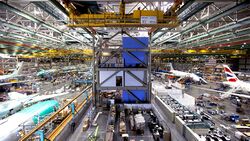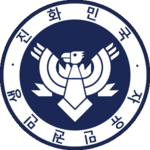Jinmu Group
 Corporate headquarter complex of the Jinmu Group, located in Donggyeong. | |
Native name | 진무그룹 |
|---|---|
| Public | |
| Traded as | DESE: JM |
| Industry | Conglomerate |
| Founded | December 2, 1861 |
| Founder | Saeho Kim |
| Headquarters | Donggyeong, Zhenia |
Area served | Worldwide |
Key people | Jinwoo Kim (President; CEO; Chairman of the Board) |
| Products | Aerospace products, automobiles, consumer electronics, medical equipment, military, robotic equipment, semiconductors, railroad vehicles, shipbuilding, steel, telecommunications equipment |
| Services | Information and communications technology, construction, financial services, medical and health care services, retail, entertainment, insurance, transport |
| Revenue | |
| Total assets | |
| Total equity | |
Number of employees | 1,190,591 (group total, 2019) |
| Subsidiaries | Jinmu C&T Jinmu Defense Industries Jinmu Electronics Jinmu Finance Jinmu Heavy Industries Jinmu Holdings Jinmu Insurance Corporation Jinmu Medical Services Jinmu Motor Company Jinmu Transport Ltd. Mir Aerospace |
| Website | jinmugroup.com |
The Jinmu Group (Zhenian: 진무그룹, stylized as JINMU) is a Zhenia-based multinational conglomerate founded by Kim Saeho. Headquartered in Donggyeong, it is the largest civilian corporation in Zhenia both by revenue and number of employees worldwide. It consists of over 90 fully-owned and partially-owned subsidiaries, most of which are owned by Jinmu Holdings.
Founded in 1861 during the Zhenian Civil War as a shipbuilding company near Shinhang by Kim Saeho, Kim and his family members spearheaded the expansion into various industries over the ages, including construction, railroad vehicles, transport and later automobiles. It surpassed the decades-older Hanshin Group to become the largest enterprise of the nation in the 1930s, while its restructuring after the Second Great War resulted in many of its businesses being converted into fully-owned subsidiaries. During Kim Shimin's rule, it has expanded its services globally, with increasing importance on its electronics and semiconductors sales. It retains some of the highest levels of global brand value in the world.
As of 2019, Jinmu Holdings remains the holding company of the entire group. Along with other corporations, such as the Hanshin and Paragon Groups, it has been one of the core driving forces of the Zhenian economy, having spearheaded the Miracle of the Danbon River. Despite ongoing competition with rival corporations and concerns over monopolies, with it subsidiaries combined, the Jinmu Group remains the largest civilian company in Zhenia, outgunning its competitors with economic and political power in the nation.
Etymology
History
Origins
The 20th Century
Contemporary History
Subsidiaries
Jinmu C&T
Originally a part of Jinmu Heavy Industries until 1989, Jinmu C&T, standing for Jinmu Construction & Trade, is a Jinmu Group subsidiary that specializes in construction and retail, both in their sales and manufacturing. Its construction division has been involved in numerous building and civil construction projects for not only the subsidiaries of Zhenia but also throughout the world, including the construction of Donggyeong Capital International Airport and the International Financial Center. Its plant division is in charge of constructing various modern power plants, often in cooperation with the Zhenia National Electric Company in foreign projects.
Jinmu C&T's retail sector controls the Jinmu Group's businesses in fashion, resorts and foreign sales. Although its fashion businesses started off with mostly casual brands, it has tapped into the luxury market through the rapid acquisitions and joint ventures with traditional luxury brands within the group. Jinmu C&T has been assisting the group's foreign sales attempts through the provision of advertising and public relations, as well as direct support in the foreign market.
Jinmu Defense Industries
Jinmu Electronics
A multinational electronics and information technology company and one of the largest subsidiaries of the Jinmu Group, Jinmu Electronics manufactures numerous consumer electronics - such as mobile phones, tablets, laptops, air conditioners, flat-screen televisions, digital cameras, refrigerators - as well as displays, semiconductors, integrated circuits and telecommunications equipment used in consumer products of both its own products and consumer products manufactured by other firms. As of 2019, it retains its position as the largest mobile phone maker in Zhenia by unit sales, with a Zhenian domestic market share of around 45.7%, while also leading the Zhenian market in an array of electronics in a de facto domestic duopoly with Hanshin Electronics.
Jinmu Heavy Industries
Jinmu Heavy Industries (JHI) specializes in most fields that are referred to as 'heavy industry', including steel, shipbuilding and aerospace engineering, to the degree that each department under the firm is considered a direct subsidiary of Jinmu Heavy Industries. Its maritime engineering department is one of the largest shipbuilders in the world, with an annual revenue of over $40 billion in 2019; its steel mills, operated by Jinmu Steel Company, was the single largest steel producer in the nation by steel output at 61.5 metric tons of steel, while many of its other divisions lead the international market in both quality and quantity. In such circumstances, Jinmu Heavy Industries remains the single largest subsidiary of the Jinmu Group, although its position has been challenged by Jinmu Electronics and the Jinmu Motor Company.

The aerospace branch of Jinmu Heavy Industries, Mir Industries, formerly known as Jinmu Aerospace Corporation, is the largest producer of civilian narrow-body aircraft in Zhenia, as well as the sole producer of wide-body aircraft in the nation. Upholding roughly 35% of the world's wide-body aircraft market, it has been the primary supplier of wide-body aircraft to airlines and governments around Zhenia. Its joint venture with Jinmu Defense Industries, Jinmu Military Air, established in 2009, iss an initiative to specialize to military aircraft and unify the manufacturing effort.
Jinmu Shipbuilding & Maritime Engineering, the maritime engineering department of the Jinmu Group, is a direct subsidy of JHI. It is home to the single largest shipyard in the world near Shinhang, being home to six primary dry docks for shipbuilding, while it also owns a total of 8 shipyards across the world. It specializes in both civilian and military vessels, although it has received far more orders in larger civilian vessels, including maritime platforms, large icebreakers, container ships, oil tankers, LNG carriers and the like. It, alongside Hanshin Heavy Industries, has been recently contracted the construction of Zhenia's new Li Shan-Class Aircraft Carrier, set to build 4 of the 8 planned vessels in its dry dock.
Although it has expanded into other fields afterwards, Jinmu Steel Company is the nation's single largest steel producer, with an output of over 61 million metric tons of steel as of 2019. It owns and operates a total of 20 steel manufacturing plants of varying size throughout the world, 11 of which are located within Zhenia. Jinmu Steel Company has expanded its business portfolio into mining, extraction and processing other metals, such as gold, copper and rare-earth minerals, following the acquisition of the Western Mining Group in 1961; since then, it has operated smaller subsidiaries specializing in mining, excavating and processing such rarer minerals as well as producing the industrial machinery needed in the process.
Jinmu Medical Services
Jinmu Motor Company
Perhaps one of the most successful of the Jinmu Group alongside Jinmu Electronics, the Jinmu Motor Company, often referred to as Jinmu Motors, is a group of automobile manufacturers and associated companies under the Jinmu Group. Formed through the reorganization of the former Zhenia National Automobile Company into smaller civilian companies after the Second Great War, it expanded its business from manufacturing affordable cars for the average Zhenian during the Third Republic to a world-class automobile manufacturer, converting Zhenia into a net exporter of automobiles. It has numerous subsidies specializing in manufacturing automobile parts, machinery, rail machinery and others.
Although its line of vehicles started from affordable, durable vehicles, Jinmu Motors has expanded its line of vehicles towards high-end luxury vehicles aimed for the growing middle and upper class of the nation, as well as existing demand from high-income populations. In response to such initiative, Nexia, the flagship brand of the company, was founded in 1995, with full support and funding from Jinmu Motors. It has also tapped into the high-performance market with the introduction of the Jinmu G brand in 2001, introducing high-performance variants of both Jinmu and Nexia models for its clients. In order to adhere to the relatively high environmental standards enforced by the Zhenian government since the 1990s, it has also extensively invested in hybrid and electric vehicles. Thanks to early investment, Jinmu Motors has maintained its largest market share of hybrid and electric vehicle sales in Zhenia, taking around 44.1% of the market, although its position in the market has been challenged by newer competition such as Rovola.
While the group primarily started out from automobile manufacturing, Jinmu Motors has also expanded onto other machinery and equipment; following the acquisition of transport assets from the Dongyang Group, it has expanded onto building railroad vehicles with its subsidiary Jinmu Mobility. While Jinmu Mobility has been undertaking further development into more ambitious projects, a majority of its effort is concentrated on rail vehicles, including many subway vehicles in the nation and some of the high-speed trains used on the [[Zhenia National Express].


